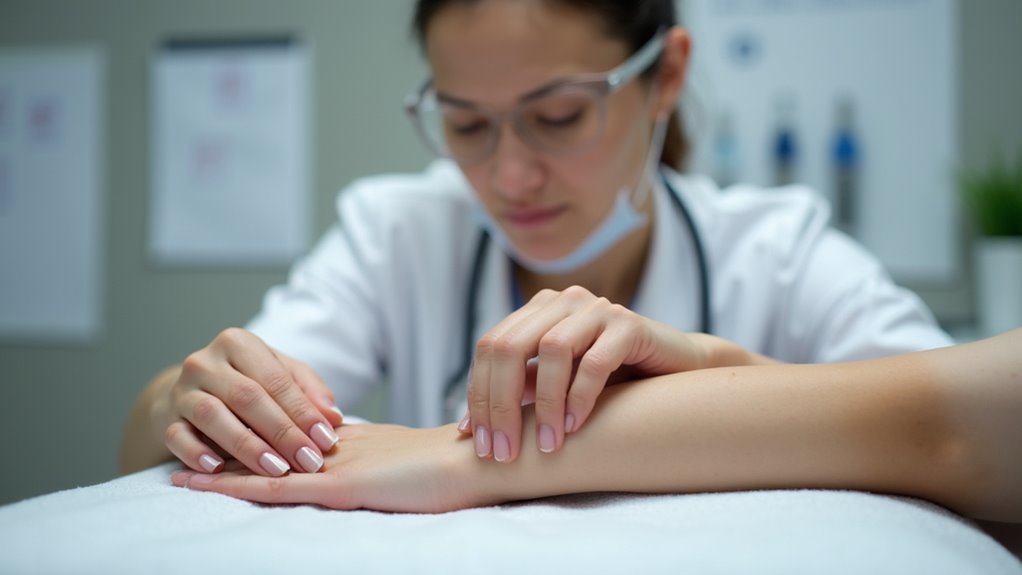What Is Tenting Skin
This post contains affiliate links. As an Amazon Associate, we earn from qualifying purchases.
Tenting skin is a condition where pinched skin stays elevated for more than two seconds, signaling reduced hydration and elasticity. This typically results from dehydration, collagen loss, or aging. Factors such as excessive sweating, illness, and insufficient water intake can worsen skin tenting. To check hydration, pinch the skin on your lower arm and observe how quickly it returns to normal. For a more detailed explanation and additional information, continue reading below.
Essential Facts in 30 Seconds
- Skin tenting measures skin’s ability to snap back after being pinched.
- Persistent skin elevation indicates dehydration or reduced elasticity.
- Common causes are inadequate hydration, excessive sweating, and fluid loss from illness.
- The test involves pinching skin and timing its return to normal.
- High-risk groups include infants, elderly, athletes, and chronically ill individuals.
Definition and Mechanism of Skin Tenting
Skin tenting shows how well your skin holds water and stays elastic.
Pinch your skin and see if it stays raised. That’s skin tenting. It happens because skin loses its stretch.
Collagen, elastin, and hyaluronic acid keep skin firm and springy. When your body lacks water, skin tissues dry out and lose bounce.
Aging also lowers hyaluronic acid and weakens collagen and elastin. This makes skin slow to snap back after pinching.
Knowing about skin tenting helps check hydration and skin health. Keep skin hydrated and elastic for a fresh, healthy look.
Primary Causes of Skin Tenting

Dehydration is the main cause of skin tenting. Losing just 2-3% of body weight in fluids makes skin lose its stretch. The body saves water for vital organs, leaving skin dry and tight.
Causes include not drinking enough water, sweating too much, vomiting, diarrhea, and fever. Athletes, outdoor workers, and older people face higher risks.
Skin that stays tight even after drinking water might mean kidney or metabolism problems. Dry skin can’t hold moisture well or stay elastic.
Drinking enough water fast helps skin bounce back and stay healthy.
Clinical Importance and Assessment

Skin tenting shows how well the body holds water and how healthy the skin is. Pinch the skin on the lower arm and watch how fast it goes back to normal. If the skin stays lifted for more than two seconds, it means the skin isn’t as elastic. This often shows dehydration or low water in the body.
This simple test helps doctors quickly check hydration, especially in older adults and children who lose fluids fast.
Check skin color, moisture, and temperature too. These signs help understand hydration better. Drinking more water can fix mild dehydration.
Watch for changes over time. Old age or long sickness can make skin less stretchy. If skin stays tented or if other symptoms appear, get medical help fast.
Using skin tenting with other checks gives a clearer picture of a person’s health.
Populations at Risk and Considerations
Skin tenting shows how well the skin holds water. Some groups have higher risk of skin tenting.
Infants and young children lose water fast, especially from vomiting or diarrhea. Older adults lose skin elasticity, so their skin tents more easily.
People with diabetes or other chronic illnesses often have weaker skin. Athletes and outdoor workers sweat a lot and lose fluids quickly.
Illnesses like fever also cause fluid loss and raise risk. Knowing who’s at risk helps check hydration early.
Proper care keeps skin healthy and prevents problems.
Treatment and Management
Managing skin tenting means checking hydration and fixing fluid loss causes fast. Use oral rehydration solutions (ORS) with electrolytes and glucose for mild dehydration.
Severe cases or those who can’t drink may need fluids through a vein.
Watch fluid balance carefully. Track how much fluid goes in and out. Check blood electrolytes often. Rehydrate slowly to avoid overload.
Treat causes like diarrhea or fever. Change medicines that cause fluid loss. Moisturizers help skin stay soft and elastic.
Know early signs of dehydration. Act quickly. This keeps skin healthy and your body strong.
Frequently Asked Questions
Can Skin Tenting Occur Without Dehydration?
Skin tenting can happen even without dehydration. Aging makes skin less stretchy. Some diseases can change skin texture too. Medicines might dry out the skin. These factors affect skin’s bounce, not just water in the body. Skin loses its tightness naturally over time. So, skin tenting does not always mean you need more water.
How Can I Improve My Skin Elasticity?
Healthy skin stays firm like a strong rubber band. Collagen is the key protein that keeps skin elastic. Eating foods rich in vitamins C and E helps your body make more collagen. Drinking plenty of water keeps skin hydrated and plump. Using creams with hyaluronic acid or glycerin can lock in moisture. Regular exercise and enough sleep also support skin health. Avoid smoking and too much sun to prevent damage. Your skin will look smoother and feel tighter with these habits.
Is Skin Tenting a Permanent Condition?
Skin tenting usually does not last long. It happens mostly when your body loses water. This condition shows that your skin needs more moisture. Drinking enough water helps keep your skin soft and stretchy. Some health problems can also make skin less elastic. Fixing those issues can improve your skin’s bounce back. Remember, good skin needs good care and enough fluids.
What Other Symptoms Accompany Skin Tenting?
Your body is made of over 75% water. Skin tenting shows when your skin stays lifted after pinching. This happens when your body lacks water. Other signs include feeling very tired, dry mouth, and dizziness. Older people often see this because their skin holds less water. Drink water often to keep your skin and body healthy.
Does Skin Tenting Affect All Age Groups Equally?
Skin tenting affects people differently depending on age. Older adults have less skin elasticity. This means their skin stays pinched longer when pulled. Younger people usually recover fast. Their skin snaps back quickly unless they are very dehydrated or sick. Dehydration lowers skin’s ability to bounce back for all ages. Skin health also depends on other factors like nutrition and sun exposure. So, skin tenting is a useful test, especially for older adults. It helps show if the body needs more fluids or care.
Conclusion
Skin tenting shows your skin lacks water or elasticity. Think of a balloon that loses air and stays pinched. This happens when your skin does not bounce back quickly after you pinch it. It often means you are dehydrated or your skin is aging.
You can check skin tenting by gently pinching your skin. If it stays up like a tent for a few seconds, drink more water. Use moisturizers to keep skin soft and smooth. Healthy skin needs water and care every day.
Seeing signs of skin tenting early helps you fix the problem fast. Drink plenty of fluids and eat foods rich in vitamins. If your skin stays dry or loose, talk to a doctor. Taking care of your skin now stops bigger problems later.
